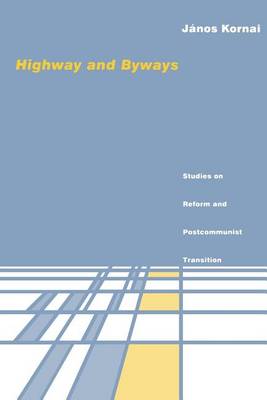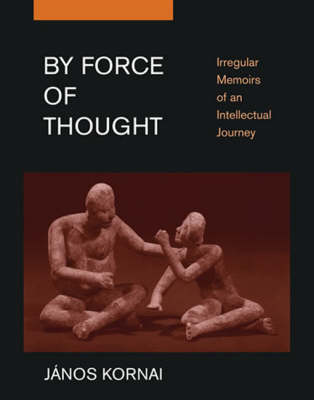MIT Press
2 total works
The metaphor that frames this collection of recent studies reflects a broad perspective and understanding of the complexities of transition: every highway and byway leads eventually to capitalism, Kornai observes, but to what kind, how fast, and at what cost? Who wins and who loses?
Hungarian economist Janos Kornai first used the metaphor of a single path to postsocialist transition in his earlier book, The Road to a Free Economy. The new metaphor that frames this collection of recent studies reflects a broader perspective and understanding of the complexities of transition: every highway and byway leads eventually to capitalism, Kornai observes, but to what kind, how fast, and at what cost? Who wins and who loses?
Kornai draws from his experiences of Hungarian reform as well as from countries of the former Soviet Union to make several major points. The first three studies describe what went wrong in countries that tried to mix elements of planned and market economies. Efforts made by communist countries to introduce market socialism (the "middle road") contained an inherent contradiction between the logic of socialism and the logic of a free enterprise system, and were doomed to failure.
In the studies that follow, Kornai analyzes the ongoing dilemmas. The transition from communism to free enterprise is filled with daunting hurdles; it requires no less than redefining ownership, changing values concerning the distribution of wealth, transferring the control of political power, creating financial institutions and enforcing financial discipline, and making deep economic sacrifice. Kornai closes with an overall survey of postsocialist transition, describing the stages that countries tend to go through, that will be particuarly useful to scholars of comparative economic systems.
Hungarian economist Janos Kornai first used the metaphor of a single path to postsocialist transition in his earlier book, The Road to a Free Economy. The new metaphor that frames this collection of recent studies reflects a broader perspective and understanding of the complexities of transition: every highway and byway leads eventually to capitalism, Kornai observes, but to what kind, how fast, and at what cost? Who wins and who loses?
Kornai draws from his experiences of Hungarian reform as well as from countries of the former Soviet Union to make several major points. The first three studies describe what went wrong in countries that tried to mix elements of planned and market economies. Efforts made by communist countries to introduce market socialism (the "middle road") contained an inherent contradiction between the logic of socialism and the logic of a free enterprise system, and were doomed to failure.
In the studies that follow, Kornai analyzes the ongoing dilemmas. The transition from communism to free enterprise is filled with daunting hurdles; it requires no less than redefining ownership, changing values concerning the distribution of wealth, transferring the control of political power, creating financial institutions and enforcing financial discipline, and making deep economic sacrifice. Kornai closes with an overall survey of postsocialist transition, describing the stages that countries tend to go through, that will be particuarly useful to scholars of comparative economic systems.
Janos Kornai, a distinguished Hungarian economist, began his adult life as an ardent believer in socialism and then became a critic of the communist political and economic system. He lost family members in the Holocaust, contributed to the ideological preparation for the 1956 Hungarian Revolution, and became an influential theorist of the post-Soviet economic transition. He has been a journalist, a researcher prohibited from teaching in his home country, and a tenured professor at Harvard. By Force of Thought traces Kornai's lifelong intellectual journey and offers a subjective complement to his academic research.
Disenchanted with communism, Kornai published Overcentralization (1956), the first book written by someone living behind the Iron Curtain to be openly critical of Soviet-style economics. Although it was attacked in Hungary, it was hailed by Western economists. The Kornai-Liptak theory on two-level planning captured the attention of mathematical economists. Kornai went on to publish the controversial Anti-Equilibrium (1971), a critique of the general equilibrium theory underpinning mainstream economic analyses of markets, Economics of Shortage (1980), The Road to a Free Economy (1990), and the summary of his lifetime research, The Socialist System (1992). An intellectual emissary between East and West, Kornai commuted between Harvard and Budapest for many years.
Kornai's memoir describes his research-including his present-day evaluation of his past work-as well as the social and political environments in which he did his work. The difficulties faced by a critic of central planning in a communist country are made especially vivid by material from newly opened secret police files and informers' reports on his activities. By Force of Thought will be an essential resource for students of economic thought, socialist systems, and postsocialist transition, and for readers interested in Eastern European intellectual life before, during, and after communism.
Disenchanted with communism, Kornai published Overcentralization (1956), the first book written by someone living behind the Iron Curtain to be openly critical of Soviet-style economics. Although it was attacked in Hungary, it was hailed by Western economists. The Kornai-Liptak theory on two-level planning captured the attention of mathematical economists. Kornai went on to publish the controversial Anti-Equilibrium (1971), a critique of the general equilibrium theory underpinning mainstream economic analyses of markets, Economics of Shortage (1980), The Road to a Free Economy (1990), and the summary of his lifetime research, The Socialist System (1992). An intellectual emissary between East and West, Kornai commuted between Harvard and Budapest for many years.
Kornai's memoir describes his research-including his present-day evaluation of his past work-as well as the social and political environments in which he did his work. The difficulties faced by a critic of central planning in a communist country are made especially vivid by material from newly opened secret police files and informers' reports on his activities. By Force of Thought will be an essential resource for students of economic thought, socialist systems, and postsocialist transition, and for readers interested in Eastern European intellectual life before, during, and after communism.

